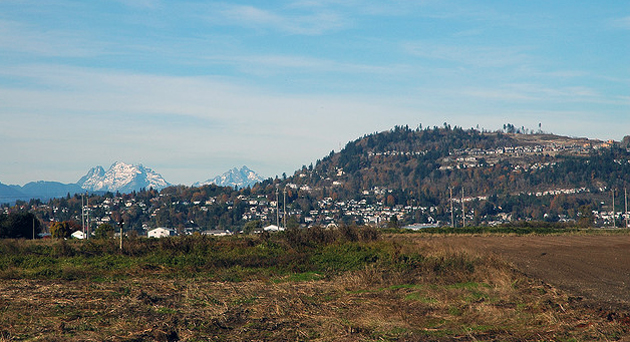UFV Life in Agriburbia research project on exhibit at The Reach
 As suburban development expands into rural areas, the urban/rural divide gets blurred.
As suburban development expands into rural areas, the urban/rural divide gets blurred.
A new “agriburbia” is emerging, where food producers and suburban development converge, creating new and complex challenges. The University of the Fraser Valley, located in “agriburban” communities such as Abbotsford and Chilliwack, is well situated to examine this geographical phenomenon.
Life in Agriburbia, led by Dr. Lenore Newman, who holds the UFV Canada Research Chair in Food Security and the Environment, is a multi-partner research project involving UFV geography students who engaged with a cross-section of the community to understand and examine the evolution of the land reserve evolved. The project also studied land excluded from protection.
The Reach Gallery Museum in Abbotsford is supporting the project with its own Life in Agriburbia exhibit from November 18 to 30. The exhibit, entitled “The Agricultural Land Reserve at a Crossroads: 40 years of Farmland Preservation in Southwestern British Columbia,” showcases maps and photographs clearly illustrating the changes to the agricultural and environmental landscape in the Fraser Valley over the past 40 years.
Exhibit hours:
Nov 18: 10 am-5 pm
Nov: 19 10am-noon, 2:30-5pm
Nov 20 & 21: 10 am-5 pm
Nov 22 & 23 3-5pm
Nov 25 & 26: 10 am-5 pm
Nov 27: 10 am-9 pm
Nov 28: 10 am-5 pm
Nov 30: noon-5 pm
Agriburban development requires a delicate balancing act as planners struggle to meet national food production requirements and local residential demands, Newman notes.
“As Vancouver continues to grow beyond the Port Mann Bridge, we see how demand for residential space competes with food productions in one of Canada’s most fertile agricultural areas,” she says.
As the provincial Agricultural Land Reserve and marks its 40th anniversary this year, and significant changes to it are being considered by the provincial government, it’s timely to examine the impact that the ALR has had on the British Columbia landscape, Newman notes.
Understanding the issues that the ALR face is an important one for Abbotsford as applications to have land excluded regularly occur, according to Newman.
“The ALR was founded before geographic information system technology was available, which created a situation where changes to the land reserve are surprisingly poorly understood,” she says.
As the value of farmland continues to increase, fueled in part by demographic changes, pressures to review and revise regulations and property protected in the ALR continue, she notes.
The Life in Agriburbia project was funded in part through a grant from the Abbotsford Community Foundation, and is a project of the Agriburban Research Centre (ARC). For more information, see ufv.ca/agriburban.





